
Experimental Hematology & Oncology
Scope & Guideline
Advancing the Frontiers of Blood and Cancer Research
Introduction
Aims and Scopes
- Immunotherapy and Cellular Therapies:
The journal prominently features research on immunotherapeutic strategies, particularly CAR-T cell therapies and their applications in various blood cancers, reflecting a commitment to explore cutting-edge cellular therapies. - Molecular and Genetic Insights:
Emphasizing the role of genetic mutations and molecular pathways in cancer progression, the journal publishes studies that delve into the molecular underpinnings of hematological malignancies and their therapeutic implications. - Tumor Microenvironment and Metabolism:
Research on the tumor microenvironment, including interactions with immune cells and metabolic reprogramming, is a core focus area, highlighting the complexity of cancer biology and potential therapeutic targets. - Clinical Applications and Real-World Studies:
The journal prioritizes studies that translate laboratory findings into clinical practice, including multicenter trials and real-world outcomes of hematopoietic stem cell transplantation and novel therapeutic regimens. - Emerging Therapeutic Strategies:
It also explores novel therapeutic agents and combinations, including small molecules, bispecific antibodies, and targeted therapies, reflecting the journal's commitment to addressing evolving treatment landscapes.
Trending and Emerging
- Advancements in CAR-T Cell Therapy:
There is a significant trend towards exploring various aspects of CAR-T cell therapies, including novel constructs, combination therapies, and innovative delivery mechanisms, highlighting the potential for personalized cancer treatment. - Integrative Approaches to Tumor Microenvironment:
Increasing attention is being paid to the tumor microenvironment, with studies investigating how immune cells, stromal components, and metabolic factors influence tumor progression and therapy response. - Focus on Biomarkers and Precision Medicine:
Emerging themes include the identification of biomarkers for predicting treatment response and disease progression, emphasizing the shift towards precision medicine in hematological malignancies. - Role of Artificial Intelligence in Oncology:
Recent publications have begun to explore the application of AI and machine learning in diagnostics and treatment planning, indicating a growing interest in leveraging technology to enhance clinical outcomes. - Research on Novel Therapeutic Targets:
The journal is increasingly featuring studies on new therapeutic targets and pathways, particularly those involved in immune evasion and resistance mechanisms, reflecting a proactive approach to developing next-generation therapies.
Declining or Waning
- Traditional Chemotherapy Approaches:
Research focusing on standard chemotherapy regimens is becoming less frequent, as newer targeted therapies and immunotherapies gain traction and demonstrate improved efficacy and safety profiles. - Less Emphasis on Single-Agent Therapies:
There is a noticeable decline in studies centered on single-agent therapies, as combination therapies and multi-targeted approaches are increasingly recognized for their potential to overcome resistance. - Limited Exploration of Older Drug Classes:
The exploration of older drug classes and their mechanisms is waning, as the focus shifts towards innovative compounds and novel mechanisms of action that promise better clinical outcomes. - Decreased Interest in Basic Laboratory Models:
Research utilizing basic laboratory models without translational implications appears to be declining, as the journal emphasizes studies that bridge laboratory findings to clinical relevance. - Reduction in Studies on Rare Hematological Disorders:
There seems to be a decrease in the volume of research dedicated to rare hematological disorders, likely due to the concentration on more prevalent and impactful malignancies.
Similar Journals
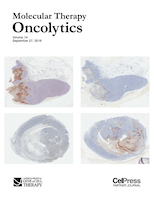
Molecular Therapy Oncolytics
Transforming Cancer Care Through Innovative ResearchMolecular Therapy Oncolytics is an esteemed Open Access journal published by CELL PRESS, focusing on cutting-edge research in the fields of oncology, molecular medicine, and pharmacology. Established in 2014, the journal has quickly gained a prominent position in the academic community, reflected in its impressive Q1 and Q2 rankings across various categories including Cancer Research, Molecular Medicine, and Pharmacology. With an impactful presence in the UK and a strong international readership, it aims to disseminate significant advancements in therapeutic strategies targeted at cancer treatment and management. By providing a platform for peer-reviewed research, Molecular Therapy Oncolytics plays a critical role in bridging the gap between scientific innovation and clinical application, making it an invaluable resource for researchers, healthcare professionals, and students striving to contribute to the evolving landscape of oncology.
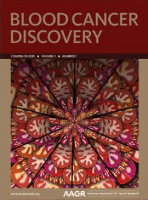
Blood Cancer Discovery
Pioneering Discoveries for a Cancer-Free TomorrowBlood Cancer Discovery is a premier academic journal published by the American Association for Cancer Research, dedicated to advancing the understanding of hematologic malignancies through cutting-edge research in the fields of oncology, biochemistry, and molecular biology. With an impressive impact factor and recognition as a Q1 journal across multiple disciplines, including cancer research and hematology, Blood Cancer Discovery serves as an essential platform for scholars and practitioners alike, facilitating impactful discourse and dissemination of pioneering findings. This open-access journal, established within the vibrant academic landscape of the United States, aims to bridge gaps in research and foster collaborations to ultimately enhance patient outcomes. Its Scopus rankings demonstrate its vital role in the critical advancement of cancer research and therapeutic development. By inviting contributions from a diverse range of disciplines, Blood Cancer Discovery is poised to drive innovation and inspire future advancements in understanding blood cancers.
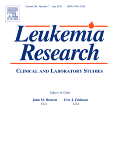
LEUKEMIA RESEARCH
Transforming insights into impactful clinical applications.Leukemia Research is a prominent academic journal dedicated to advancing the field of hematology and oncology, focusing on the latest research developments related to leukemia and other hematological disorders. Founded in 1977 and published by Pergamon-Elsevier Science Ltd in the United Kingdom, this esteemed journal has established itself as a vital resource for researchers and clinicians alike. With an impressive impact factor and categorized in the top quartiles of Cancer Research and Hematology, it provides a platform for high-quality research articles, reviews, and clinical studies that contribute to a deeper understanding of leukemia's complexities. Although not an Open Access journal, Leukemia Research ensures widespread dissemination of knowledge crucial for developing innovative treatment strategies and improving patient outcomes. Researchers, professionals, and students in the fields of hematology and oncology will find this journal an invaluable asset in staying at the forefront of leukemia research, as it prepares to expand its impact through converged years of publication extending into 2024.
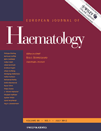
EUROPEAN JOURNAL OF HAEMATOLOGY
Transforming Hematology Through Rigorous ResearchEUROPEAN JOURNAL OF HAEMATOLOGY, published by Wiley, serves as a vital resource for experts in the field of hematology, focusing on the latest advancements in blood disorders and therapies. With an ISSN of 0902-4441 and an E-ISSN of 1600-0609, this esteemed journal has been disseminating knowledge since 1986 and continues to thrive, converging its visionary approach through to 2024. Notably, it holds a distinguished Q2 ranking in Hematology and an impressive Q1 ranking in the broader category of Medicine (miscellaneous) as of 2023, highlighting its significant contribution to the scientific community. With a Scopus rank of #45/137 and a 67th percentile in the field, the journal is recognized for its rigorous peer-reviewed research, making it an indispensable publication for researchers, practitioners, and students aiming to stay at the forefront of hematological studies. Though not an open-access journal, it ensures broad accessibility to critical findings via its subscription model, thus fostering an informed and globally engaged audience.
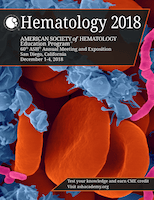
Hematology-American Society of Hematology Education Program
Navigating the Future of Hematology TogetherHematology-American Society of Hematology Education Program is a premier peer-reviewed journal dedicated to advancing the field of hematology through comprehensive educational content. Published by the American Society of Hematology, this journal plays a crucial role in disseminating knowledge to researchers, clinicians, and students in hematology and related disciplines. With an impressive Q1 status in the field, it ranks among the top journals at the forefront of hematological research, as evidenced by its 60th percentile ranking in Scopus' Medicine - Hematology category. Although it does not offer open access, the journal provides invaluable insights and educational resources from leading experts, focusing on the latest advancements, treatment protocols, and evolving understanding of blood disorders. Covering a wide range of topics, from basic research to clinical applications, this journal is essential for anyone seeking to deepen their expertise and stay informed on the latest developments in hematology. For further engagement, readers can access insightful articles published since 2001, ensuring a rich repository of knowledge for ongoing research and clinical excellence.
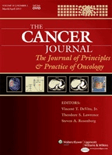
CANCER JOURNAL
Uncovering the Mysteries of Cancer for Better Care.CANCER JOURNAL is a leading peer-reviewed publication dedicated to the dissemination of innovative research in the fields of cancer research and oncology. Published by Lippincott Williams & Wilkins, this journal serves as an essential resource for researchers, clinicians, and students seeking to advance their understanding of cancer mechanisms, treatment strategies, and patient care. With an ISSN of 1528-9117 and an E-ISSN of 1540-336X, it boasts a respectable 2023 Q2 category ranking in both Cancer Research and Oncology, reflecting its impactful contributions to the scientific community. Although it currently does not offer open access, the journal's rigorous peer-review process ensures the publication of high-quality, relevant studies that stimulate further investigation and collaboration among professionals. Since its inception, the journal has evolved through several converged years, maintaining a steadfast commitment to addressing the complexities of cancer biology and treatment. At its core, CANCER JOURNAL aims to foster advancements in oncology, making it a vital platform for sharing pivotal findings that could transform cancer research and therapeutic practices.
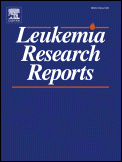
Leukemia Research Reports
Empowering breakthroughs in hematology and oncology.Leukemia Research Reports, published by Elsevier Advanced Technology, is a prominent open-access journal dedicated to the latest advancements in the field of hematology and oncology. Since its launch in 2012, this journal has been a vital resource for researchers, healthcare professionals, and students aiming to disseminate and access high-quality research articles focused on various aspects of leukemia and related blood disorders. With an impact factor indicative of its significance in the field, Leukemia Research Reports currently holds a Q3 quartile ranking in both Hematology and Oncology, and is included in key databases such as Scopus. The journal not only embraces a commitment to open access, ensuring that research is freely available, but also actively promotes collaborations that strive to enhance our understanding and treatment of leukemia. Based in the United Kingdom, this journal continues to play a crucial role in fostering innovation and knowledge sharing within the medical community.

EXPERIMENTAL HEMATOLOGY
Advancing the Frontiers of Hematological ResearchEXPERIMENTAL HEMATOLOGY, published by Elsevier Science Inc, is a leading journal in the field of hematology, distinguished by its impactful contributions to the study of blood-related disorders and cellular biology. With an ISSN of 0301-472X and an E-ISSN of 1873-2399, this journal has established a significant presence since its inception in 1973, continuing to be relevant through 2024. It holds a commendable Q1 ranking in Hematology and Q2 in various significant categories including Cancer Research, Cell Biology, Genetics, and Molecular Biology, recognizing its quality and influence in the scientific community. Researchers and professionals can access a wide range of meticulously peer-reviewed articles that promote cutting-edge research and foster collaboration across disciplines. As a vital platform for disseminating innovative findings, EXPERIMENTAL HEMATOLOGY empowers its audience to delve deeper into the complexities of hematological research and brings to light the advances critical for improving patient outcomes.
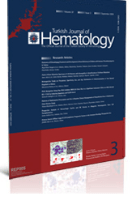
Turkish Journal of Hematology
Empowering the global hematology community through open access.Turkish Journal of Hematology is an esteemed publication dedicated to advancing the field of hematology, producing influential research since its inception in 1999 under the auspices of GALENOS PUBL HOUSE. With an Open Access model, it facilitates widespread dissemination of knowledge, allowing researchers, clinicians, and students to stay abreast of the latest developments in blood disorders and treatments. With an ISSN of 1300-7777 and an E-ISSN of 1308-5263, the journal holds a commendable position in the academic community, evidenced by its 2023 Q3 ranking within the hematology category and its standing at #80 out of 137 in the Scopus database, placing it in the 41st percentile. Covering a wide scope of topics within hematology, this journal serves as a critical resource for disseminating innovative research and clinical practices pertinent to the ongoing challenges faced in this vital area of medicine. With its continuous publication until 2024, Turkish Journal of Hematology remains a beacon for enhancing the understanding and treatment of hematological conditions within the Turkish and global medical communities.

Journal of Hematology
Pioneering Discoveries in Blood HealthThe Journal of Hematology, published by ELMER PRESS INC, serves as a pivotal platform for disseminating cutting-edge research in the field of hematology. With an ISSN of 1927-1212 and an E-ISSN of 1927-1220, this journal is committed to advancing scientific knowledge and clinical practice through high-quality peer-reviewed articles encompassing all aspects of blood disorders, from basic science to health policy implications. While the journal currently operates under a traditional access model, it nonetheless prioritizes the rapid publication of significant findings, ensuring that researchers, clinicians, and students have timely access to the latest advancements in hematological research. Positioned to bridge gaps in knowledge and foster collaboration among scholars worldwide, the Journal of Hematology is an essential resource for anyone invested in this vital area of medicine.